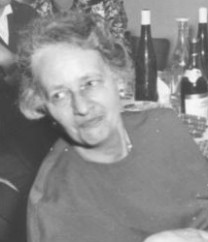She was born as Karin Hissink in Berlin in 1907, being the daughter of a german mother and a dutch father. She spent her childhood and youth in her hometown and finished school in 1928.
Throughout the following five years, Hissink studied not only in Berlin but also in Munich and Lausanne, Switzerland. Philosophy, Anthropology, Prehistory, Archaeology and Ancient American Studies were the major subjects. Her Ph D thesis on Yucatan masks was completed in 1933 and published the next year.
After briefly being the volunteer of Walter Lehmann in Berlin, Hissink resettled in Frankfurt/Main, where she had contact with Leo Frobenius and members of his institute. In 1934 she participated in a research trip that not only took her to Transjordan and Libya but also to Morocco, Algeria and Tunisia. During this expedition she documented a wide range of petroglyphs.
After her return to Germany Hissink took up an assistant position at the Institute for Cultural Morphology (now: Frobenius-Institute) and also worked at the Anthropological Museum (now: Museum for the Cultures of the World). Furthermore, she did an educational journey to the US.
In World War II a number of Hahn-Hissinks close relatives and friends died. Moreover, she took over many important tasks both at the Frobenius-Institute and the museum during this period. After 1945 Hissink dedicated her work mainly to rebuilding and reconstructing collections and archives damaged during the war. She participated at the first meeting of German anthropologists after WW II (Frankfurt/Main, 19.-21.09.1946).
In 1947 Hissink became custodian at the Anthropological Museum and lecturer at the Johann Wolfgang Goethe-Frankfurt University. Throughout the following years she also supported the relocation both of the Frobenius-Institute and the museum.
Moreover, Hissink did a field research in Bolivia between 1952 and 1954, accompanied by her (later) husband and painter Alfred Hahn. Throughout the 1960s she also did a number of field researches in Middle America (e.g., Mexico, Honduras, Costa Rica). Eventually she worked on the material collected and wrote a number of monographs. In 1966 she married Alfred Hahn and changed her name into Hahn-Hissink.
In 1967 Hahn-Hissink became major custodian at the Anthropological Museum in Frankfurt. She retired five years later, but still participated in many of the museums activities. In 1980 she moreover did a research trip to Canada.
Katrin Hahn-Hissink died in 1981.
(Text written by Vincenz Kokot in March 2012, based on Trimborn, Hermann, 1982, ZfE, ed. 107, pp. 3 - 6; photography by courtesy of Siegfried Seyfarth)
Short Portrait: Karin Hahn-Hissink

Karin Hahn-Hissink
 further information
further information

